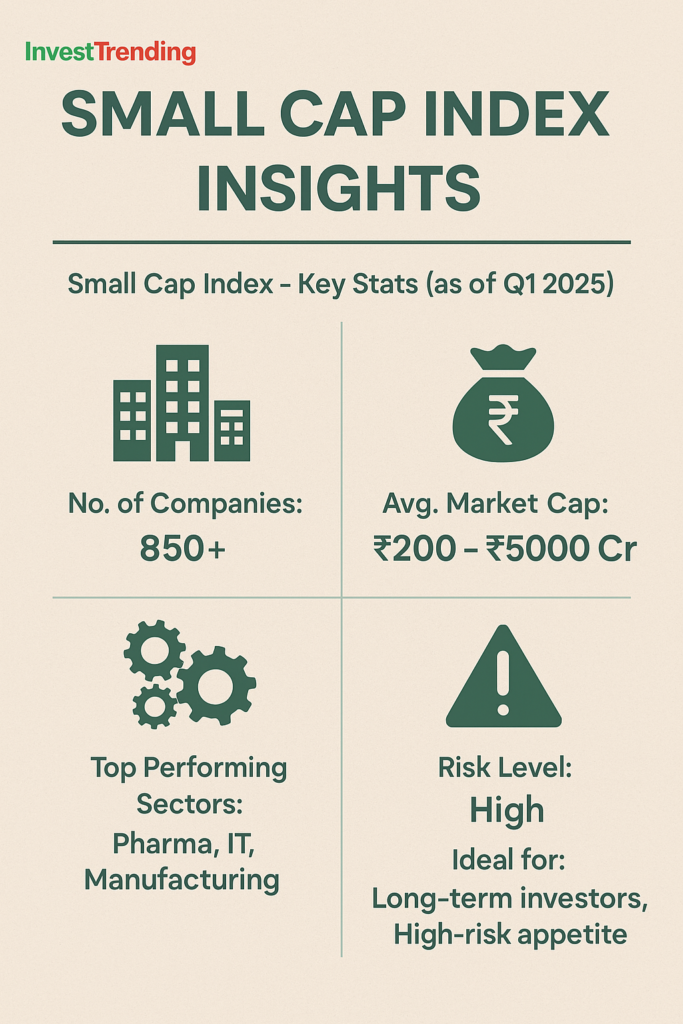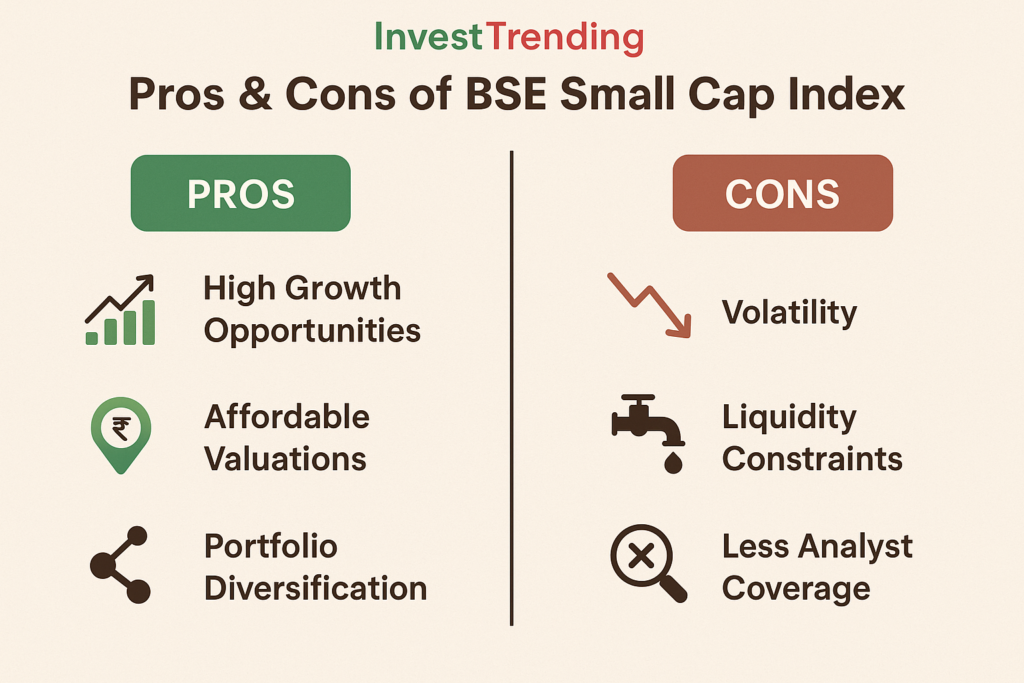Introduction
In the ever-evolving world of stock markets, understanding indices is crucial for making informed investment decisions. One such vital index in the Indian stock market is the BSE Small Cap Index. Catering to companies with relatively smaller market capitalizations, this index offers significant potential for high returns, albeit with a corresponding level of risk. In this blog post, we’ll dive deep into the BSE Small Cap Index, its composition, benefits, risks, performance, and strategies to consider while investing in small-cap stocks.
What is the BSE Small Cap Index?
The BSE Small Cap Index is a market capitalization-weighted index managed by the Bombay Stock Exchange (BSE). It represents the performance of the small-cap segment of the Indian stock market. Typically, small-cap companies are those ranked beyond the top 250 listed companies based on market capitalization.
Key Features of the BSE Small Cap Index:
- Coverage: Represents a wide universe of small-cap stocks.
- Diversity: Includes companies from various sectors like pharmaceuticals, technology, textiles, chemicals, and more.
- Volatility: Higher than large or mid-cap indices due to the size and sensitivity of small-cap stocks.
- Potential Returns: High-growth potential, especially during bullish market conditions.
How is the BSE Small Cap Index Calculated?
The index is calculated using the free-float market capitalization method:
Free-float Market Cap = Share Price × Number of Shares Available to Public
The index value is derived using the formula:
Index Value = (Current Free-float Market Cap / Base Market Cap) × Base Index Value
Small Cap Index – Key Stats (as of Q1 2025)
| Metric | Value |
|---|---|
| No. of Companies | 850+ |
| Avg. Market Cap Range | ₹200 – ₹5000 Cr |
| Top Performing Sectors | Pharma, IT, Manufacturing |
| Risk Level | High |
| Ideal for | Long-term investors with high-risk appetite |

Sectors Covered in BSE Small Cap Index
| Sector | Percentage Allocation (Approximate) |
| Pharmaceuticals | 12% |
| IT & Technology | 10% |
| Consumer Goods | 9% |
| Industrial Products | 8% |
| Chemicals | 7% |
| Textiles | 6% |
| Others | 48% |
This diversification makes the index less dependent on the performance of any single industry.
Performance of BSE Small Cap Index (Past 5 Years)
The small-cap index has witnessed multiple cycles of highs and lows. Here’s a snapshot:
| Year | BSE Small Cap Index Return (%) |
| 2019 | +7.8% |
| 2020 | +21.2% |
| 2021 | +62.5% |
| 2022 | -5.9% |
| 2023 | +32.1% |
Insights:
- The index tends to outperform in bullish cycles.
- In bearish markets, small-cap stocks are more vulnerable to correction.
Why Should You Invest in the BSE Small Cap Index?
- High Growth Potential: Many small-cap companies are in their growth stage, offering the possibility of exponential returns.
- Early Mover Advantage: Investing early in emerging companies can yield long-term benefits.
- Diversification: Helps balance your portfolio by exposing you to various industries.
- Better Valuation Opportunities: Small caps often trade at lower valuations compared to large caps.
Risks Associated with BSE Small Cap Stocks
- Higher Volatility: Price fluctuations can be steep and frequent.
- Liquidity Issues: Smaller companies may have lower trading volumes.
- Limited Information: Analysts cover fewer small-cap firms, so data may be scarce.
- Operational Risks: Smaller firms are more vulnerable to market and economic conditions.
Investment Strategies for Small Cap Index
- SIP (Systematic Investment Plan): Helps reduce risk by averaging out the cost over time.
- Long-term Focus: Small caps require patience and a long investment horizon.
- Diversify Your Portfolio: Combine small caps with large and mid-cap investments.
- Use Mutual Funds or ETFs: If direct investment feels risky, go for mutual funds tracking the BSE Small Cap Index.
- Monitor Regularly: Track your investments and re-balance periodically.
Top Performing Small Cap Stocks (2024)
| Company Name | Sector | YTD Return (%) |
| KPIT Technologies | IT Services | +75% |
| Aarti Drugs | Pharmaceuticals | +42% |
| Deepak Nitrite | Chemicals | +38% |
| KPR Mill | Textiles | +36% |
| Vaibhav Global | Consumer Goods | +33% |
Pros & Cons of BSE Small Cap Index

Conclusion
The BSE Small Cap Index stands as a dynamic yet high-risk opportunity within the Indian stock market landscape. For investors seeking high-growth potential, this index offers a window into the fast-evolving world of emerging businesses. The journey through the small-cap space is not for the faint-hearted—it demands patience, consistent monitoring, and a long-term outlook. However, those who navigate it wisely can unlock substantial returns.
By understanding the index’s sectoral composition, volatility patterns, and historical performance, you can better assess its fit within your investment goals. Strategies like Systematic Investment Plans (SIPs), mutual funds, and portfolio diversification are practical tools to manage risk while participating in this segment’s upside potential.
Whether you’re a seasoned investor or a beginner exploring your options, the key lies in staying informed, disciplined, and aligned with your financial goals. Don’t let short-term market jitters overshadow the long-term potential of India’s small-cap ecosystem.
Before taking the plunge, always evaluate your risk appetite, consult with a certified financial advisor, and most importantly, stay invested in knowledge.
Frequently Asked Questions (FAQs)
Q1: Is investing in the BSE Small Cap Index risky? A1: Yes, due to the volatility and lower liquidity of small-cap stocks, the index is considered high-risk. However, it also offers high-reward potential for long-term investors.
Q2: How can I invest in the BSE Small Cap Index? A2: You can invest via small-cap mutual funds, ETFs that track the index, or by purchasing individual small-cap stocks listed under the index.
Q3: What is the minimum investment needed? A3: There’s no fixed minimum if you’re investing in individual stocks. However, mutual funds may have a minimum SIP starting from ₹500.
Q4: Can beginners invest in small-cap stocks? A4: Yes, but it’s advised that beginners start through mutual funds and maintain a diversified portfolio to manage risk.
Q5: How often is the BSE Small Cap Index updated? A5: The index composition is reviewed and updated periodically, typically every six months.



